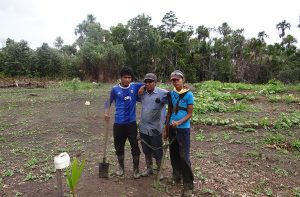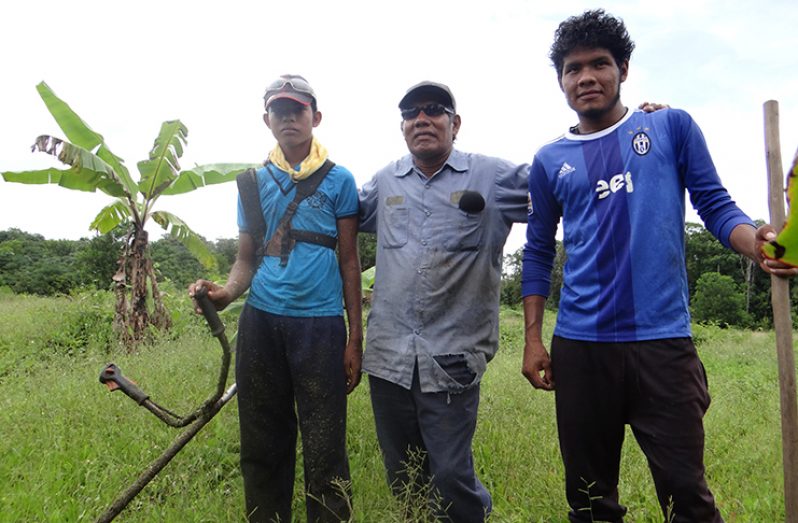– says Essequibian Leon Griffith
WHEN the Guyana Chronicle visited the quiet but productive-looking village of the Tapakuma in Region Two to meet with Leon Griffith, he and his two sons were so busy tilling the soil that they hardly heard the sound of our vehicle approaching through the trail to find him.
Griffith was busy with his young sons, Oslen Griffith, 23, and Kevon Griffith, 17. He also has one daughter, who is also a full-time farmer. She is 29-year-old Rhandez Griffith.
“I grew up in farming and I went on to do some logging for a while, then I diverted back into farming fully and knowing that Guyana is on a Low Carbon Strategy Plan. I was [on] the council working along with the Guyana Forestry [Commission] here in Tapakuma, being aware of the plans for Guyana and where we are going,” the very proud father said.
He said he always had a plan to go back fully into farming, since he knew that, that would have been one of the best things that he could have ever done with his life.
Griffith said he enjoyed doing logging and at that time it was his main source of income to help him maintain his three children who were all very young and in school. “However, my mind was always on farming and so as soon as I came off of the logging job, I went straight back to farming on a full-time scale,” he stated.
Griffith explained that with time he had to decide on a new and strategic approach to farming his land. His first approach, he said, was to plant cash crops and await the arrival of the different produce. He noted that while he experienced bountiful harvests, those came only after long periods of time and this for him was not a feasible venture.
“I had to change my strategy; I was forced to rethink and change the way I did farming and so we (he and his sons) had to do reforestation ever so often. So we decided on a new and much more productive approach, which is intercropping. This is where we are now putting down the permanent crops in between the other cash crops, where we do not have to wait and wait so as to get a harvest and also to sell; different things are happening, all at once, and so we now able to earn all the time,” he stated.
ORGANIC CROPS
Griffith is one of those farmers who depend entirely on his farm for his livelihood; and so he told the Guyana Chronicle that he must pay attention to every aspect of his farm – from the planting of a seed, the growth and development of each crop, right through to the time of harvest.
“Because we grow mainly organic plants and we encounter problems with pests and diseases which invade some our plants from time to time, such as the bananas, we have to keep researching and thinking of ways in which we can overcome these obstacles,” he said.
Griffith noted that the agouti (a large, long-legged burrowing rodent related to the guinea pig) was one of his main problems. He said that they would eat some of his produce, especially from the vine plants such as the water melon, squash and pumpkins.
 “However, they have to eat and they would not eat all, so I think that what we have to do is to replant fruits and vegetables and they eat them. Not that we are happy to have them eat our plants, but we recognise that they have to live as well,” he asserted.
“However, they have to eat and they would not eat all, so I think that what we have to do is to replant fruits and vegetables and they eat them. Not that we are happy to have them eat our plants, but we recognise that they have to live as well,” he asserted.
Griffith explained that since he was a farmer from a young man, he understands what it takes to be a farmer; about the soil he has to till and even about the harvest he expects to receive. Because of this, he said that he tries his best to teach his children, who are all interested in the work.
“I discover that they like what they do; they also like what I do and so I work towards encouraging them to be very successful. We have our challenges, but the idea is to fight to get success and to get good harvests out of what we plant. Every plant is different and so they must be treated in a different way,” he said.
CONSTRAINTS
The weather conditions are one of the major constraints that Griffith mentioned, even as he also spoke about the lack of finances to do some of the things that he desires for his farm.
“My boys are still very young and I would like to see them become very successful in this job of farming. I started it as a child, a very young man and they followed me; the girl also followed me and so I would like to know that they make much success of it. So far we are not doing too badly; we are managing and we are getting somewhere, but I would like to see more. We work very hard,” he said.
The size of the farm that the Griffiths are working on and continuing to clear does pose some challenges for them, especially because of the changing weather conditions. They are doing the work manually and the very rains that they have been experiencing have been a clear hindrance to them, even though at every cessation of the rain they go out and work.
Griffith said that this is necessary and since he has the cooperation of his sons in the field, he is encouraged to press on, knowing that time and time again he has experienced good results.
“It is only that you have to understand what you are doing, for example the soil you have to work with; sometimes you have to help the soil to be better, because when working with good soil it can dictate the type of harvest you would have and whether you would be a successful farmer or not… I am a successful farmer; my sons are successful farmers too, even though we do get some real challenges sometimes, but that is life,” he said. (mercilinburke2017@gmail.com)












